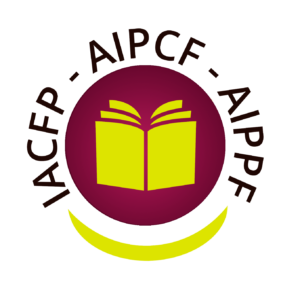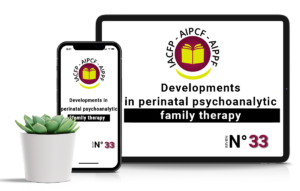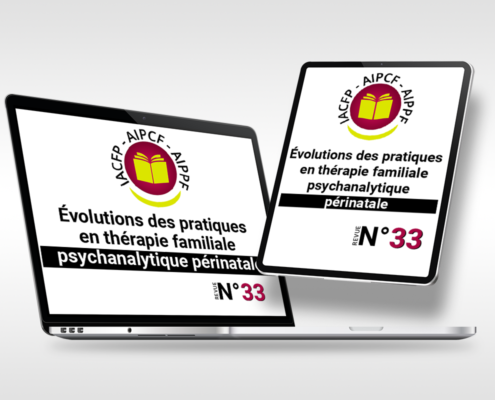Psychoanalytic support for families during the perinatal period has been a developing practice for several decades, demonstrating its effectiveness in prevention. When a new family is forming, the task is not merely to support an individual or a relationship—a dyad or a triad, a baby within their family or within an institution—but rather to listen to the family group as a whole. This includes its present, past, and future story, its family narrative and roots embedded in life’s uncertainties, migrations, and the soil of cultural differences, etc. As Ruffiot noted in 1981[1] : “We are fabric before being offspring.”
In a true psychic journey, the new family reworks this heritage in order to make it its own before the child arrives. What has been inherited from previous generations is revisited in order to be passed on to descendants, who in turn will transform this legacy through transmission. From the time of pregnancy, the regression and deconstruction experienced by the entire group promise future progress, in organizing the family across generational lines. This intense perinatal period is, as Racamier said in 1978[2], a form of psychoanalysis of childhood. We propose to view it as a true psychoanalysis of the family (Darchis, 2016)[3].
However, it is also known that this necessary period of crisis can be harsh and destabilizing. The perinatal period can sometimes be a true tsunami or a destructive tidal wave. Each birth mobilizes transgenerational dynamics, and the neonatal situation can become a threat to individuals or the couple, which may break down (violence, alcoholism, infidelity, etc.). It is sometimes difficult for families to reconcile the romantic couple bond and the parental bond: the transgenerational becomes entangled in the alliance bond (Joubert, 2007)[4]. Fear of disorganization of implicit pacts and contracts can hinder the process of constructing the new group. This difficult passage evokes strong resistances as families struggle with old sufferings, unprocessed or encrypted traumas, secrets, and unspoken truths. Defensive structures manifest as pregnancy denial, parental postpartum depression or decompensation, enmeshment and incestuous dynamics, or distancing and neglect. Expectant and new parents grappling with the cursed part of their legacy (grief, shame, uncertain filiation, etc.) suffer during the arrival of a baby who may in turn become a symptom-bearer.
The parents’ own psychological issues can compound the perinatal crisis (fragile identities, melancholy, addictions, somatic illnesses, etc.). This upheaval can be further intensified by particular circumstances or neonatal incidents (displacement, unemployment, relational breakdowns, teenage pregnancy, prematurity, disability diagnosis, death…). All of these struggles must be supported.
We will explore the effects of these disorders in family clinical settings and examine the indications for interventions that support the group and foster the necessary process of navigating this transitional period. The framework of perinatal psychoanalytic family therapy (PPFT) guides families through the essential crisis of the perinatal period, when destructive and pathogenic aspects risk jeopardizing what is normally a time of reorganization and growth. PPFT, which receives the family from the time of pregnancy, with the baby in utero, supports the indispensable reworking of the family’s psychic legacy so that each member may progressively become a part of an individuated group and a relatively autonomous subject.
Care providers and institutions, trained to be attentive to the specific and particular forms of suffering in perinatality, offer therapeutic spaces to future and new parents, sometimes extending this welcome to siblings and grandparents. Networking with perinatal partners is also invaluable.
Our practices have evolved with original conceptualizations and innovations in neonatal units, maternity and pediatric hospital care, as well as in early childhood services, maternal and child protection, child welfare, child psychiatry, etc.
Transmission in this field invites us to continue exploring and transforming our theoretical foundations, balancing continuity with change. Our research must be shared across generations of international professionals. Let us disseminate knowledge to also globally advance perinatal psychological care, which closely accompanies this foundational and organizing time of the new family around the arrival of a little one.
[1] Ruffiot A. (1981), La thérapie familiale psychanalytique, Paris, Dunod.
[2] Racamier P.-C. (1978), Psychoses de la maternalité, Mère mortifère, mère meurtrière, mère mortifiée, Paris, ESF.
[3] Darchis E. (2016), Clinique familiale de la périnatalité, Paris, Dunod.
[4] Joubert Ch. (2007), Le rôle du transgénérationnel dans le lien de couple, Le Divan familial, 18, Paris, In Press, 69-79.
 https://aipcf.net/revue/wp-content/uploads/2025/12/articulo33_en.png
800
1200
carli
https://aipcf.net/revue/wp-content/uploads/2024/08/nuevoLogoRevista-300x292.png
carli2025-12-17 20:36:002025-12-18 13:42:40Introduction to the issue “Developments in perinatal psychoanalytic family therapy”
https://aipcf.net/revue/wp-content/uploads/2025/12/articulo33_en.png
800
1200
carli
https://aipcf.net/revue/wp-content/uploads/2024/08/nuevoLogoRevista-300x292.png
carli2025-12-17 20:36:002025-12-18 13:42:40Introduction to the issue “Developments in perinatal psychoanalytic family therapy”

